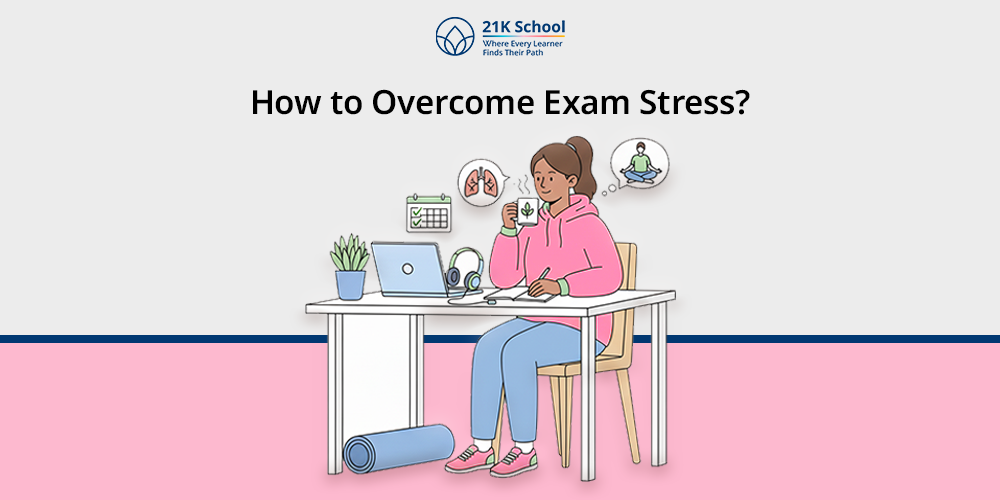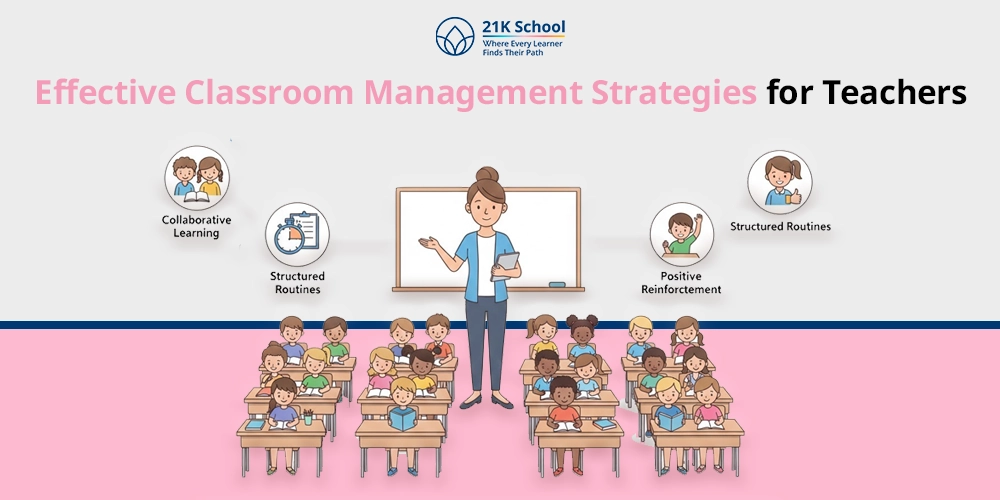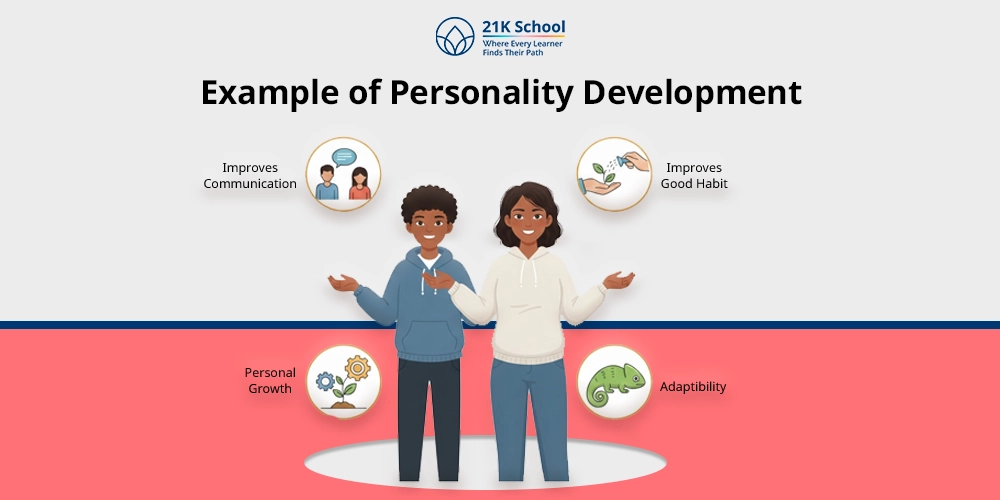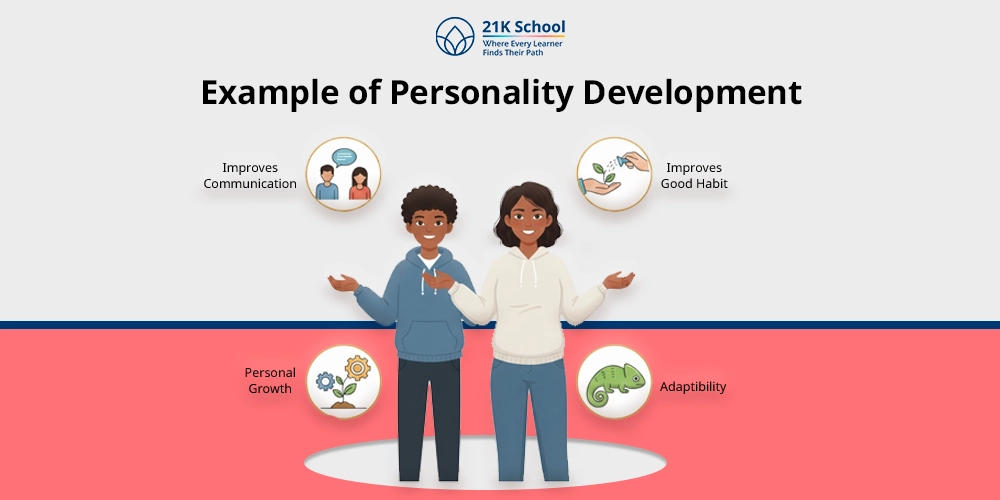
Have you ever wondered why exams are so stressful and how you can avoid it?
People go through exam stress all the time. No one can deny, exam stress is normal for everyone but extreme exam stress hinders students’ education and childrens mental health as well.
Exam stress can be caused by work stress, failure fear, low self esteem and perfectionism. It may also be that genetics or past anxiety experiences make some people more susceptible to exam anxiety.
Preparing for exams is not the only time exam stress occurs; It also happens when you take an exam, or when you pass an exam and then wait for your results. You can get over exam stress with proper sleep, the right food and diet, daily exercise, positive thinking, learning from others, etc.
They say students should remain upbeat and courageous while taking the exam and give their best.
Explore study tips for students .
Contents
What is Exam Stress?
Exam stress, which is also referred to as exam anxiety or exam fear is very normal. It is ok to be nervous about tests, exams, papers, and presentations. A little bit of exam or study stress makes you put in more effort.
What is bad is when stress affects your study or performance. It may be fear of failing, parents’ and teachers’ high expectations, poor preparation or just the desire for great grades.
That kind of stress leaves a student sick, tired, irritable or crazy during the exam. While some stress is good, which in turn improves focus, at the same time, it is also bad and counterproductive.
Top 14 Tips: How to Overcome Exam Stress
Exam stress happens naturally but there are ways around it. And these techniques are: getting a routine, reading every day, getting enough sleep, eating right, etc.
With these techniques students can manage exam stress and go into exams confidently. Below are ways for students to cope with study/exam stress
1. Start Positively
And a student has to go into exam preparation upbeat with a positive mindset. Negative thinking causes stress and motivation whereas positive thinking makes a student feel more in charge/competent.
If the student believes he can succeed he is more persistent. It reduces anxiety and stress with realistic goals and calm preparation.
2. Proper Sleep
Sleeping well helps a student remember, concentrate and be emotionally balanced. Sleep deprivation increases stress, learning capacity or exam performance. Resuscitated minds are more alert and retain information better.
Teens aged 13-18 need 8-10 hours of sleep per night according to major health authorities. It help with preparation and exam concentration. Regular sleep helps with mental & academic performance.
3. Create a Study Plan
Structured study plans avoid panic at the last minute. If a student breaks their workload down into smaller tasks with a study timetable they feel less overwhelmed.
A good study plan organizes the preparation and makes it less stressful. They also give breaks during exam time too.
4. Focus on Exam Preparation
Focusing helps a student remember material better on exam day. Interruptions and multitasking make studying stressful.
In a quiet positive study environment a focused student gains little more than confidence. And focusing on something frees you from rushed or unproductive revision just before the exam date.
5. Use Creative Study Methods
Creative study methods – visual aids / flashcards / explaining things to others – help the student remember the material. All of these methods break up the routine of traditional study and make studying fun.
Creative approaches take into account other methods of learning , so the student feels motivated and confident. Active study keeps you calm and interested in the subject matter.
6. Daily Exercise
A student can exercise and unwind. Exercising increases endorphins – body stress relievers – which lower anxiety and mood.
So even very simple things like walking, stretching or yoga can help with concentration and emotional balance during exam season. Physically active students are generally better prepared for exams.
7. Eat Healthy Diet
Nutrition relieves exam stress. So a healthy student with energy and concentration will do better on a balanced diet.
Reduced junk food and water intake cures fatigue and mood swings. And a nourished brain is sharper and remembers things better. Eat well and you can forget about exam time.
8. Take Study Break
Stopping for breaks during study sessions prevents mental fatigue and stress. If a student studies constantly without resting it can cause burnout and productivity loss. Short planned breaks help the mind recharge and keep things in check.
Breaks in the study routine help the student to concentrate again on the task at hand. Such a balance is very important in exam preparations.
9. Practice Regularly
Mock exams, quizzes or past question papers are good for familiarising a student with exam format and time management . Regular revision reinforces what you learn and points out where you can improve – no more last-minute stress.
Frequent practice by a student increases knowledge and ability to perform under pressure. It also lowers anxiety and helps the mind prepare for the real exam.
10. Stay Focused
Consistent focus saves time & stress during exam period. Easy distractions kill study sessions and cause anxiety and frustration. Learn how to avoid distractions while studying .
Having study goals helps the student. And concentration eases the anxiety of being unprepared. Staying focused also helps the student relax and prepare for exams.
11. Talk to Someone
Talking with someone else about thoughts and worries may help a student. Talking gives students some release and perspective.
And sometimes it is just moral advice. For example, a heard student may be less anxious and more focused on studying and exam preparation .
12. Study in a Group
Group work helps students to share knowledge, doubts and motivation, which also problems collaborative learning . For example, a student preparing with peers may have discussions, explanations and group problem solving instead of being isolated.
Studying in groups is more interactive and less stressful. But the group has to stay academic. Managed group study sessions are useful during exam time too.
13. Stay Confident
Confidence relieves exam stress. Problems will not demoralize an optimistic student. Simple positive self-talk builds confidence.
Explore about stress relieve activities for students .
It takes the anxiety out of wondering what the student learned and how they are doing now. Kids who do confidence building do well on the exam.
14. Adapt a Positive Mindset
An optimistic examination viewpoint only comes with a positive attitude. A positive attitude makes a student see exams as learning opportunities.
Good thinking lowers fear, motivates and increases emotional well being. If they are positive and look for solutions instead of failure then they will have less exam stress and better performance.
Learn how to improve study habits .
Reasons for Exam Stress
Some exam stress is ok – learn how to deal with it helps with exam nervousness. Find out what causes stress for students and how to cope with exam stress. See reasons for exam stress below.
1. Educational Pressure
Exam pressures from schools/institutions and competitive academic environment add to exam stress for many students. Pressure to get good marks in exams to cover a large syllabus and to meet academic standards in a short time often puts the student under stress .
Not meeting expectations of the student increases anxiety and motivation. You get mentally tired of the same academic demands without emotional support & bored of studies.
2. Poor Academic Performance
A poor academic record increases exam stress for students. Some students with low grades fear they will get the same fate again.
Lacking confidence causes negative thinking and less motivation to study. Teachers or peers might also think the student is being judged. That means instead of focusing on improvement the student may be depressed and anxious about future exams.
3. Improper Sleep
Sleep deprivation messes with concentration, memory and emotional intelligence – all important on exams. People who study late or worry too much lose sleep.
And then they are feeling worse both mentally and physically – stress builds up. Without rest the brain can not process information properly and the student becomes anxious and tired during preparation and exam time.
Explore why bedtime routine is important for a child .
4. Fear of Failure
Most exam stress is caused by fear of failing. Hence, a student may feel their future is determined by exam results alone. This creates negative self-talk, anxiety & poor focus.
If it is serious, it will make the student quit studying altogether. It is that constant fear of failing oneself or others which stops the student from doing well or thinking clearly under pressure.
5. High Expectation
Excessive expectations from parents, teachers or even the student himself may make exams very stressful. If a student is pressured to get top scores to meet those expectations then underperformance is feared.
And that can cause burnout, emotional instability and even low self-worth if the student feels they are not living up to those standards. Sometimes you can not control both internal and external expectations – this causes exam anxiety.
Conclusion
Exam stress is part of student life, but exam stress is also bad for your grades. So it is about failure, high expectations, poor preparation, and low confidence.
You can control it though, with sleep, a healthy diet, some physical exercise and a structured study routine. Being positive, focused and practising gives you confidence and lessens anxiety.
Talking with someone or doing group studies can give you emotional support. With a calm mind and belief in themselves ,students can cope with exam stress.



